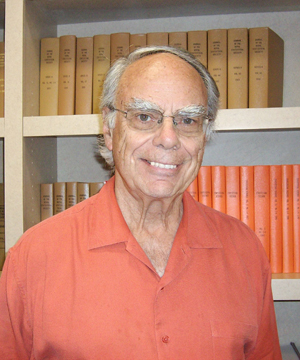W. Jackson “Jack” Hall, PhD, Fellow of the IMS, Emeritus Professor of Statistics and Professor in the Department of Biostatistics and Computational Biology at the University of Rochester, died peacefully on October 14, 2012, at age 82. In the course of his long and highly distinguished career, Jack made deep and influential contributions in many areas of statistics, including decision theory, Bayesian statistics, survival analysis, semiparametric inference and sequential analysis. In more recent years, he used his expertise in sequential analysis to work extensively with medical colleagues on developing innovative statistical designs for clinical trials in cardiology.
Jack was educated at Johns Hopkins University, the University of Michigan and UNC Chapel Hill, where he received a PhD in Statistics in 1955 under Wassily Hoeffding. In 1953–4 he attended the Universities of Manchester and Cambridge as a Fulbright Scholar. After a spell at what is now the Center for Disease Control and Prevention in Atlanta (helping to track down the faulty batches of the Salk polio vaccine) he took a faculty position at UNC Chapel Hill, where he became full professor in 1965. He moved to Rochester in 1969 to chair the new Department of Statistics. He was also a key figure in the establishment of the Division of Biostatistics, the forerunner of the current department. Jack held visiting positions at Stanford, Berkeley, Sheffield, Seattle, Reading, Oxford and Sydney. Jack was a fellow of IMS, ASA and the American Association for Advancement of Science, and an elected member of the ISI.
Jack was known for his devotion to teaching, including advising graduate students. At Chapel Hill he played a pivotal organizational role in maintaining the graduate program at a time of transition, and advised several PhD students. At Rochester he established the Statistics graduate program and advised a total of 12 PhD students. Many of Jack’s students have since gone on to distinguished careers. Jack was the first recipient of the University of Rochester Lifetime Award for Graduate Education in 2004. Common themes in the many letters of support included the care and attention he gave to his students, his detailed reading of their dissertations, and help with personal matters from the time they came to Rochester till they graduated and later. Many became family friends.
Jack published over 150 papers. A number of early papers, some co-authored with Alexander Langmuir, described the spread of the 1955 polio outbreak and the methods taken to monitor it. His research interests spanned a huge range of modern statistical activity including sequential analysis (with Aiyu Liu, Benjamin Yakir, and Robert Loynes), sufficiency and invariance (with Robert Wijsman and Jayanta K. Ghosh); contiguity theory (with Robert Loynes); efficiency issues in semiparametric estimation and testing (with Wei-Min Huang, Sungsub Choi and Anton Schick, David Mathiason, Jon Wellner); Bayes procedures (with Siddartha Dalal, Melvin Novick); large deviations and p-values (with Diane Lambert); and survival analysis (with Jon Wellner, Debajyoti Sinha).
In a landmark collaboration encouraged by the editors of the Annals of Mathematical Statistics, E. L. Lehmann and J. L. Hodges, Jack’s 1965 paper with Robert Wijsman and Jayanta K. Ghosh provided the statistical community with an important paper on the subtle connections and interactions between sufficiency and invariance and applications to sequential analysis. As indicated in the paper, the basic facts were discovered “before 1950” by Charles Stein and re-discovered independently by Don Burkholder in 1958 before being rediscovered (again independently) by each of the three co-authors in the late 1950s and early 1960s.
Jack’s interest in sequential analysis continued throughout his career, beginning with his work on sequential versions of Stein’s two-stage test in the early 1960s, and continuing until work in the period 2001–3 with Benjamin Yakir and Aiyi Liu. Much of this research also interacted substantially with his applied work on cardiology clinical trials, with Arthur Moss and others, at the University of Rochester Medical Center.
Jack remained active professionally until ill-health forced him to retire in July 2012. He was a devoted husband and father and an avid outdoorsman who loved to ski and cycle. In addition to his wife, Nancy, he is survived by children Rebecca, Bryan, and Kay Cohen, stepchildren Barbara and Edwin Hufsmith, and seven grandchildren. His daughter Jacqueline Minet predeceased him. The Department of Biostatistics and Computational Biology at the University of Rochester department has set up the William Jackson Hall Graduate Student Fellowship as an enduring tribute to Jack’s legacy and influence on the Statistics doctoral degree program and its students. For information on making a donation to this fund in Jack’s memory, please contact the department chair, Robert Strawderman.
Written by David Oakes, Jon Wellner, Robert Strawderman & Siddhartha Dalal

Comments on “Obituary: W. Jackson Hall 1930–2012”